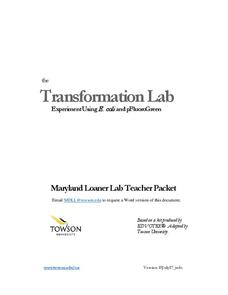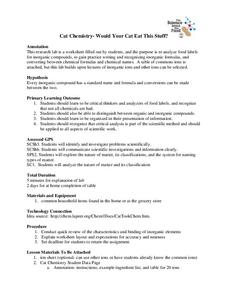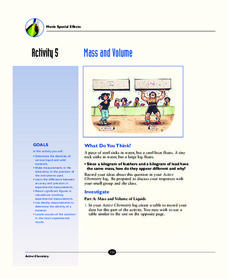National Science Teachers Association
Safety in the Science Classroom, Laboratory, and Field Sites
The best learning environment is a safe learning environment. Remind young scientists about safety rules and regulations in the science lab, the classroom, and the field.
Sunburst Visual Media
Clouds
Support science instruction with a combination of engaging activities and skills-based worksheets that focus on clouds. Learners take part in grand discussions, write an acrostic poem, complete graphic organizers, solve word...
Curated OER
Reflection and Refraction
What is a prism? A place for light waves that commit minor refractions! The thorough resource includes three hands-on investigations covering light reflection and refraction; mirrors, lenses, and images; and optical systems. Subject...
It's About Time
Who Eats Whom?
Packed with visual aids and multiple learning opportunities, an engaging exercise challenges individuals as they explore the role of producers, consumers, and decomposers. After discussing differences between food chains, food...
Towson University
Transformation Lab
Transform your class' understanding of genes and antibiotic resistance with the Transformation Lab. Junior geneticists create and observe their own resistant strains of E. coli through research, discussion, and experimentation. The...
University of Georgia
Would Your Cat Eat This Stuff?
Processed foods use inorganic compounds for flavoring and preservation. This take-home laboratory challenges scholars to find 20 different compounds identified on the labels of foods to list on their data collection sheet. The activity...
Towson University
Chestnut Tree Lab
What will your class learn in a curious tale of a fungus, a virus, and a chestnut tree? Biology scholars discover the world of viral biocontrols through a DNA restriction lab. Groups research the decline of the American chestnut tree at...
It's About Time
Plate Boundaries and Plate Interactions
How does the Earth continually repair itself? Explore the answer to this question, and others, with a unit on plate boundaries and interaction. Pupils classify the types of movement at plate boundaries and identify the...
It's About Time
Mass and Volume
Don't be so dense that light bends around you; study the relationship between mass and volume instead. Young chemists measure the density of a variety of liquids and solids. A reading passage and analysis questions introduce pupils to...
It's About Time
Monitoring Active Volcanoes
The fastest growing volcano in recorded history grew more than 150 meters in less than a week and to more than 424 meters in less than a decade. How do we safely monitor active volcanoes? Young scientists design an...
It's About Time
Properties of Matter
Never trust an atom; they make up everything! Young chemists make modeling dough and add another ingredient to change the properties. Scholars then compare the properties of emulsion to composite materials. A reading passage and analysis...
Other
Easy Science for Kids: All About Force: Pushing and Pulling
Students will understand that pushes and pulls can have different strengths and directions. Students investigate the effects of these different pushes and pulls.











